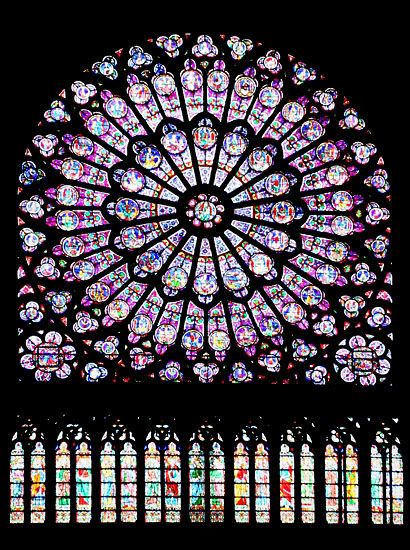
Rose Window Notre Dome de Paris
The Rose was a symbol of heaven in Dante where the Paradisio
is structured on concentric circles like a great rose. Of course God
at the center.
The New atheists constantly mock the SN as though they know what it is. When the discuss it they include anything not naturalistic. The modern conception is that SN is everything from Bigfoot to the resurrection, include g ghosts, UFOs and Psychic Powers. It never occurs to them Christians were using the term before the modern concept of naturalism so it can't just mean everything that[s not naturalistic. Jerry Coyne is an evolutionary biologist at the University of Chicago. He is also an apologist for atheism. Coyne says something more interesting than than Dawkins does, however, he says that SN could be studied by science.[1] Although, I'm sure Dawkins probably agrees with his reasoning. If SN could not be so studied it would be unreasonable to fault the notion for not having scientific evidence. Coyne asserts that modern science's tendency to set religion aside as belonging to a different order of reality (magisteria) thus being unsuitable is “accomodationist dogma.” [2]
If you’ve frequented this site, you’ll know that I disagree with this stand. I adamantly maintain that science can indeed test the supernatural—at least those claims about the supernatural that involve its interaction with the real world. Indeed, you’ll be familiar with several claims about the supernatural that have already been tested, and refuted : the Genesis story of creation, the story of Adam and Eve, a 6,000-year-old earth, and the efficacy of intercessory prayer, as well as paranormal phenomena like near-death experiences, telepathy, and precognition. If you invoke a form of the supernatural that claims to have real-world consequences, then those consequences necessarily fall within the ambit of science. This means that any type of theistic faith involves hypotheses that are “scientific”.[3]
Of course he wrongly assumes that theistic faith per se includes young earth creationism, healing and the occult. Most versions of faith based upon modern liberal protestant theology would be immune. He also says, “In other words, we can provisionally accept that there is no god because we don’t see the kind of evidence that we should see if god were present (answered prayers, conformable miracles at Lourdes, and so on….)” Keep reading, we are about to see it.
Ironically, I agree with him on one thing, science can test those aspects of the SN that affect our lives, the only problem is the things he names are not SN. He also does a slippery slope by stating we can test those aspects of SN that overlap with nature then asserting we can go all the way and deny the reality of God based upon that. In this chapter I explore the nature of the original Christian concept. Secientistic thinking writes SN out of reality as unscientific, and as superstition. They justify this, as we just saw Coyne do, by pointing to the ability of science to amass a huge fortress of facts while no facts can be found that prove the existence of a Supernatural realm or any Supernatural events, or beings. Yet the problem is that the original concept of the SN was not about any of these things (witches and six day creation), but about human nature and it's relation to divine nature, plus a set of experiences that issue from that relationship. Those experiences are empirical and have been easily documented to exist and to have effects that make them unique. SN is the tendency of divine encounter to raise human nature to a higher level. Here we can understand human nature as both behavioral tendencies as well as consciousness. This means the scientific fortress of facts is predicated upon a concept of an order of nature that did not exist when the term “supernatural” came into being. Therefore, scientistic skepticism is ideological and not scientific; it uses the mystique of science (the illusion of Technique) to interject its own metaphysical assumptions while triumphing over the assumption of a straw man argument.
Anthropologist Benson Saler quotes the great Emile Durkheim in pointing out that the idea of a bifurcated reality made up of an upper real of “supernatural” and a lower real of “natural” is a modern Western concept that begins with modern science. “[the mysterious world of supernatural above the natural] is not of primitive origin….it is science and not religion that has taught men that things are complex and difficult to understand.” [4] Saler points out that this concept of the realm above nature presupposes a ream of nature bound together by natural laws. This is a modern concept brought to us by science. He also draws upon Durkheim, Hallowell, and Richard in support' the use of the term “supernatural” has a long history that proceeds this modern scientific concept. [5]
Therefore, this separation and divison of natural law from that something beyond it can't be the original Christian concept.
The Original Concept of Supernature
All of these objections assume a certain version of the SN. It has become a catch-all for anything non materialistic or naturalistic that scientistic types want to snub without really having to disprove it. Supernatural today means anything from ghosts, Bigfoot, UFO to psychic powers, and angels and demons and God in heaven. Not so with the original concept. In the early centuries of Christian philosophy the original Greek fathers thought of God as transcendent but they did not necessarily conceive of that as “supernatural.” The Church fathers took their notions from the Greeks. “The term 'supernatural' and cognate words in various European languages were employed Long before the rise of modern natural sciences. [6] The school of Miletus (Ionian Greeks) are generally credited with being the first school of critical philosophy. Their use of the term Phusis (roughly translated “nature;” from this term we derive our word Physics.) caused them to be deemed a “physicists” [7] The Stoics had a concept of natural law and materialism. Their natural order would not have been based upon supernatural design. Aristotle viewed the universe working in a rational manner out of necessity rather than design. Ultimately he grounded everything (motion) in the prime mover, but his prime mover was not anthropomorphic and did not design a higher order but worked by necessity. Many ancients had a notion of natural order without a contrasting notion of a supernatural order. “For some the most interesting opposition was conceptualized as a contrast between nature and art...Christian thinkers through the fifth century did not develop theologically significant uses of supernatural” [8]
Saler points out that St. Cyril of Alexandria is a significant exception, using the Greek huper phusin to describe theology of God's grace in elevation of humanity above nature though Christ. He was writing in 444AD around the same time as pseudo Dionysius (500A.D.) who is credited as having coined the term “Supernatural.”. Dionysius was in Syria. Before this time there is found no word that could be rendered “supernatural” used of God's transcendence in the New Testament or in the Patristics. [9] They saw the primary ontological distinction as pertaining to God and creation. Thus while we would classify angels and demons as supernatural in the category with God, apart from natural things, they would classify angels and demons with the created order, blew the level of God as creator. [10]Leading up to the period in which began to emerge terms that would be understood as SN, used by Christian mystics such as Cyril and Dionysius, from the end pf the Apostolic age, the Church faced certain struggles over doctrines with a variety of groups all labeled under the same stigma as “Gnostic.” There was confusion over Chrisatian identity, confussion over the Christianity of Gnostic ideas of dualism between matter and spirit. The Orthodox Church emerged in dialectical relation to the gnostics. Even though they rejected the notion of the evil nature of matter that most such groups taught they created their own dualism with the moral superiority and ontological exaltation of spirit over matter. This forged the way for Neoplatonic Christianity.
Neoplatonism began with Plotinus who died around 270A.D.. Another major figure in the school was Proclus (d.485). that the notion of supernatural really begins to emerge. Neoplatonism is a variation on Platonic thinking that posited a totally transcendent origin of all things. This was a principle, not a personal god. They called it “the one” (a term used by Plato –sort of the “form of the forms”). The one did not create the world dirctly but the world emerged from it through a series of emanations, much like the particulars from the realm of the forms. For that reason the physical realm is not separated out from the one completely and thus the one is emanate within the world. Christian Platonists used hierarchies of angels and what we would call “supernatural beings” in place of emendations. [11] In names such hierarchies Dionysius used, among other things, the term huper hamousios. Hamousios was an important term in the Chronological disputes and the Trinitarian controversy it means “substance” or “being.” God is three persona in one substance. It could be translated essence. [12] Huper might be translated “superior.” It might be “above.” That plays into the notion of a realm above nature. Higher nature. Eugene R. Fairweather concures with Dionysius' use of the term and also points out that John of Damascus (676-749) also used it in the same way (speaking of God in the adverbial form Supernaturaliter). [13]
When various works of Dionysius were translated into Latin by John Scotus Erigena, he rendered it supernaturalis, from which we derive our term “supernatural.” [14]The term was given the Neoplatonic implication of superior substance. Thomas Aquinas preserved the Neoplatonic aspects of the word. God is the first cause who actively and purposefully creates all things, as opposed to the unmoved mover which works unconsciously and of necessity. Moreover, God endows the creatures with their own necessity so that morally each one is an end in itself. [15]Scholastic theology developed the dichotomy of the realm of SN above the realm of nature based upon the distinction between nature and Grace. The centerpiece of that theology is God's free gift of Grace to man in the redemptive act of Christ. This is a gratuity added to human nature and enables a new relationship between creature and creator. That relationship consists of adoptive showmanship and culminates in the elevation of human nature.[16]
The Trace of God, by Joseph Hinman, on Amazon. The 200 studies in this book prove that Mystical experience is real, this article just proved that the original concept of SN is mystical experiemce. Therefore, SN is real.
Part 2
Sources
[1]
Jerry Coyne, “Can Science Test
The Supernaural, Yes!,” Why
Evolution is True.
(6/27/2012) URL:
[2] Ibid.
[3] Ibid.
[4] Emil Durkheim quoted in Benson Saler, “Supernatural as a Western
Category,” Ethos,
Vol. 5, issue 1, first published online 28 Oct., 2009, 31-53 35. PDF
URL:
http://onlinelibrary.wiley.com/doi/10.1525/eth.1977.5.1.02a00040/pdf
(accessed 1/25/2016).
[5] Ibid.
[6] Ibid., 36
[7] Ibid., 39 Saler draws upon Jeager (1947) in trying to define this
complex term, phusis.Basically
it means “growth and emergence”
[8] Ibid., 38-39.
[9] Ibid., 43
[10] Ibid. 44.
[11] Henry de Lubecl , Remarques sur
l'Hisoire du mot “Surnaturale.” Nouvelle Revue
Theologique, (1934) 61:
225-249, 226.
[12] Saler, Op. Cit., 47.
[13] Eugene R. Fairweather, “Christianity and the Supernatural,” in
New Theology no.1. New York: Macmillian, Martin E. Marty and
Dean G. Peerman ed. 1964. 235-256, 239.
[14] Ibid. see also Fairweather, 239.
[15] Ibid.
[16] Ibid., 48.



 ) is "true". I support liberal politics because of my secular humanism.
) is "true". I support liberal politics because of my secular humanism.